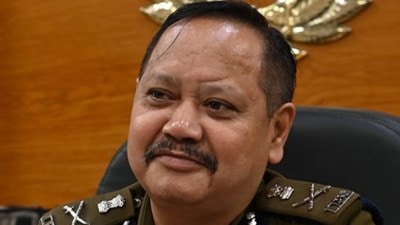‘Aim is always to save lives’: Trained with Scotland Yard, ACP Shalini Sharma on how to negotiate during hostage crises, suicide attempts
Shalini Sharma is Mumbai police's first trained negotiator, and she recently returned to the city after a two-year posting in Nagpur.
 Sharma’s negotiation skills have been tested time and again in real-life situations in Mumbai, with several successful outcomes. (Express Photo)
Sharma’s negotiation skills have been tested time and again in real-life situations in Mumbai, with several successful outcomes. (Express Photo)Shalini Sharma, Assistant Commissioner of Police, has emphasised the importance of negotiation in hostage situations, having played key roles in several successful crisis interventions, including preventing suicides.
Mumbai police’s first trained negotiator, Sharma recently returned to the city after a two-year posting in Nagpur. Speaking to The Indian Express in the wake of the Powai hostage crisis, she said negotiation is a skill developed during operations, and it prevents further escalation of crises.
Talking specifically about the Powai situation, where a man named Rohit Arya held 17 children and two adults hostage inside an acting studio in the Powai area, she said, “In the Powai incident, the police had given enough time for negotiation to Rohit Arya.”
The crisis ended when police commandos stormed the studio and shot Arya, who later died of injuries, while the police rescued all hostages safely.
“Each negotiator has their own skills and tactics to communicate while handling either a hostage, an attempt to suicide or a kidnapping-related incident,” said Sharma.
She said she is open to training the next generation of police officers in crises. “If the government wants, we will definitely make a team of negotiators again.”
Sharma’s negotiation skills have been tested time and again in real-life situations in Mumbai, with several successful outcomes. One of the incidents occurred in 2017 when a 32-year-old lawyer threatened to jump from the 18th floor of an under-construction building in Wadala.
Initial police efforts failed to bring her down, so Sharma was called from the Chembur police station. She spent nearly three hours in a calm, continuing dialogue and ultimately managed to convince the woman to step away from the ledge of the building. The lawyer was struggling with depression due to her failed marriage.
In another instance in 2012, a 17-year-old girl locked herself on a terrace after a fight with a friend and was planning to die by suicide. Sharma spent more than two hours negotiating with the teen and managed to persuade her to open the door, thereby avoiding drastic steps.
When the 26/11 terror attack happened, the Mumbai police had no trained hostage negotiators. Terrorists took several foreign nationals hostage in the Taj Mahal Palace hotel, the Oberoi Trident hotel, and Chabad house, but due to the lack of a specialised force for operation as well as a negotiation team, it was difficult to handle the situation.
Scotland Yard training
Recognising the Mumbai police’s need for expertise in the area, Sharma was selected from a dozen officers for specialised training in London.
Sharma was then an assistant police inspector posted in the extradition cell of the crime branch (known as the Mumbai police’s liaison officer with Interpol). She was sent to New Scotland Yard for a two-month course in hostage negotiation and crisis management.
“The first two weeks were spent studying in their training school, and later they went under rigorous training with the Scottish police for two months, not just to handle terrorist hostage situations, but also to train them in suicide prevention, kidnapping situations, domestic violence intervention and emotional counselling,” said Sharma.
 Recognising the Mumbai police’s need for expertise in the area, Sharma was selected from a dozen officers for specialised training in London. (Express Photo)
Recognising the Mumbai police’s need for expertise in the area, Sharma was selected from a dozen officers for specialised training in London. (Express Photo)
After completing her negotiation training in the UK, when she returned to Mumbai in May 2010, she started transferring her knowledge to other officers. Under the guidance of senior officers, she made a team of 12 to 14 officials and trained them for two weeks. All were ranks of assistant inspector and police inspectors. She also provided training to the Anti-Terrorist Squad.
“During the Covid lockdown, the UK police came to India and they had some discussion with the National Security Guard (NSG). The UK police asked about me with an NSG official, so NSG contacted me, but I was Covid-positive and was under treatment. But in 2022, the NSG called me again to give negotiation training to their officers and I gave them a training,” said Sharma.
Although negotiation is now part of police training, it requires a proper team where everyone has their own responsibility according to the strategy made while handling a crisis, she said.
“First responders will do their work, and the operation team will do their work. There should be proper coordination, and each skill needs to be developed while conducting regular training and drills,” she added.
“Every negotiation is about understanding the person you are dealing with, whether he is a terrorist, a protester, or someone in depression; the motive is always to save lives,” she said.
Transfer of 4 ACPs
On December 4, a transfer order was issued for four ACPs. Besides Sharma, the others transferred are ACP Sandeep Bhagwat, who moved from Mumbai to become Deputy Superintendent of Police (DySP) in Sangli; Ashok Rajput, who was transferred from Thane to Chhatrapati Sambhaji Nagar; and Ashok Shelke, who moved from Nagpur to the Criminal Investigation Department (CID) in Pune.







